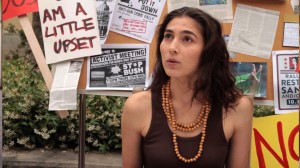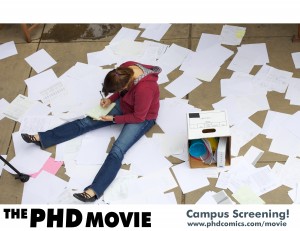 The blogosphere sounds like a strange galaxy in another dimension, but is the term used to refer to all blogs (such as this one!) and their interconnections. Readers of blogs share their thoughts and views in a collected community. Academic blogs tend to focus on professional topics, showing explicit connections between blog content, research issues and academic life, and more academics than ever are now engaging with the blogosphere to share their work, establish networks and connections, and to develop their careers. But are the benefits really that great?
The blogosphere sounds like a strange galaxy in another dimension, but is the term used to refer to all blogs (such as this one!) and their interconnections. Readers of blogs share their thoughts and views in a collected community. Academic blogs tend to focus on professional topics, showing explicit connections between blog content, research issues and academic life, and more academics than ever are now engaging with the blogosphere to share their work, establish networks and connections, and to develop their careers. But are the benefits really that great?
Academics who blog regularly report positive outcomes, such as networking and collaborating, finding new audiences and opportunities, disseminating research more widely, and building reputation. Bloggers argue that far from diluting scholarly success (as has been suggested by some academics), online writing can be a serious tool for academic practice. Blogging should be seen as part of a programme of dissemination and collaboration, and is best used alongside traditional academic outlets (such as journals) as a means of amplifying the reach and potentially the significance and future direction of the research.
Blogs are usually accessed by a different audience to traditional forms of academic dissemination. They are freely accessible to a global audience, and their public, collaborative nature has helped many academics to develop new relationships with students, peers and other audiences (such as schools, charities, the general public, etc) and to develop cross-disciplinary partnerships. The accessibility and exposure to different audiences tends to broaden reputations, which opens up new professional possibilities. Blogging can lead to further research and knowledge exchange work, public presentations and interviews, as well as invitations to write for academic publications.
Academic blogging is a method of public engagement, allowing academics to connect and share their work with the public, generating mutual benefit for both blog authors and readers. This can help to build trust and understanding of universities, and can increase our relevance to, and impact, on society.
Academic bloggers at BU include:
- Christos Gatzidis – Dr Christos Gatzidis’ Scientific Diary
- Dimitrios Buhalis – Dimitrios Journeys
- Darren Lilleker – Politics, PR and Marketing
- Media School blog
- School of Tourism blog
If you’d like access to add posts about your research to the Research Blog or would like your own blog then let me know.
 Watch this excellent short video from BU’s
Watch this excellent short video from BU’s  There have been a number of strong Research Council bids submitted since my last email, most of which have been run through our internal peer review scheme (the RPRS) which is great news – good luck therefore to Venky Dubey (DEC) for submitting large bids to both the MRC and the NIHR, Barry Richards (MS) for a bid on interactive extremism submitted to the AHRC, Bronwen Thomas (MS) for submitting a bid on researching readers online to the AHRC, Neal White (MS) for being part of a large multi-institution bid submitted to the ESRC’s joint council Connected Communities scheme, and to Genoveva Esteban (ApSci) for a bid on food webs to NERC. One cross-School bid has been submitted this period – good luck to Peter Thomas and Zoe Sheppard (HSC) and Samuel Nyman (DEC) who submitted a joint bid on reducing falls for inpatients with dementia to the NIHR, an excellent example of cross-School working.
There have been a number of strong Research Council bids submitted since my last email, most of which have been run through our internal peer review scheme (the RPRS) which is great news – good luck therefore to Venky Dubey (DEC) for submitting large bids to both the MRC and the NIHR, Barry Richards (MS) for a bid on interactive extremism submitted to the AHRC, Bronwen Thomas (MS) for submitting a bid on researching readers online to the AHRC, Neal White (MS) for being part of a large multi-institution bid submitted to the ESRC’s joint council Connected Communities scheme, and to Genoveva Esteban (ApSci) for a bid on food webs to NERC. One cross-School bid has been submitted this period – good luck to Peter Thomas and Zoe Sheppard (HSC) and Samuel Nyman (DEC) who submitted a joint bid on reducing falls for inpatients with dementia to the NIHR, an excellent example of cross-School working. Congratulations to Rob Britton (ApSci) for being awarded a Marie Curie Intra-European Fellowship grant from the EC – this is excellent news! Congratulations are also due to Genoveva Esteban (ApSci) for winning a contract with the Environment Agency to conduct an aquatic biodiversity survey, Richard Stillman (Apsci) for securing a contract with Halcrow Ltd, Mark Maltby (ApSci) for securing a small bone assessment contract with Bedfordshire County Council, Keith Hayman (ST) for securing a CPD contract with Hall and Woodhouse, Roger Herbert (ApSci) for securing a contract with the Shellfish Association of Great Britain to research pacific oyster issues, and to Mark Dover (ApSci) for winning a contract with Dataloft. Congratulations also to Mike Molesworth (Liam Toms and the CEB team) (MS) for securing a contract with Work Research Ltd, to Steve Calver (and the MRG team) (ST) for winning a number of contracts with local authorities and a repeat contract with the Holburne Museum in Bath, to Bronwen Russell (and the Bournemouth archaeology team) (ApSci) for a securing a number of contracts with Distributed Generation Limited, and to Richard Gordon (ST) for securing a training contract with NEMA..
Congratulations to Rob Britton (ApSci) for being awarded a Marie Curie Intra-European Fellowship grant from the EC – this is excellent news! Congratulations are also due to Genoveva Esteban (ApSci) for winning a contract with the Environment Agency to conduct an aquatic biodiversity survey, Richard Stillman (Apsci) for securing a contract with Halcrow Ltd, Mark Maltby (ApSci) for securing a small bone assessment contract with Bedfordshire County Council, Keith Hayman (ST) for securing a CPD contract with Hall and Woodhouse, Roger Herbert (ApSci) for securing a contract with the Shellfish Association of Great Britain to research pacific oyster issues, and to Mark Dover (ApSci) for winning a contract with Dataloft. Congratulations also to Mike Molesworth (Liam Toms and the CEB team) (MS) for securing a contract with Work Research Ltd, to Steve Calver (and the MRG team) (ST) for winning a number of contracts with local authorities and a repeat contract with the Holburne Museum in Bath, to Bronwen Russell (and the Bournemouth archaeology team) (ApSci) for a securing a number of contracts with Distributed Generation Limited, and to Richard Gordon (ST) for securing a training contract with NEMA..



 The
The 



 Watch this excellent short video from BU’s
Watch this excellent short video from BU’s  The Leverhulme Trust has announced that the Research Leadership Awards are now open to applications. Each university is only allowed to put forward one candidate for this scheme.
The Leverhulme Trust has announced that the Research Leadership Awards are now open to applications. Each university is only allowed to put forward one candidate for this scheme. The first closing date for the current round of the BU Fusion Fund competition is 13 January 2012.
The first closing date for the current round of the BU Fusion Fund competition is 13 January 2012.













 Connecting Research with Practice: FoodMAPP Secondment in Austria and France
Connecting Research with Practice: FoodMAPP Secondment in Austria and France Health promotion paper read 8,000 times
Health promotion paper read 8,000 times The Beautiful Work Challenge: On Birth
The Beautiful Work Challenge: On Birth Free event on Solutions to Inequalities in Dementia Diagnosis and Care
Free event on Solutions to Inequalities in Dementia Diagnosis and Care MSCA Postdoctoral Fellowships 2025 Call
MSCA Postdoctoral Fellowships 2025 Call ERC Advanced Grant 2025 Webinar
ERC Advanced Grant 2025 Webinar Horizon Europe Work Programme 2025 Published
Horizon Europe Work Programme 2025 Published Horizon Europe 2025 Work Programme pre-Published
Horizon Europe 2025 Work Programme pre-Published Update on UKRO services
Update on UKRO services European research project exploring use of ‘virtual twins’ to better manage metabolic associated fatty liver disease
European research project exploring use of ‘virtual twins’ to better manage metabolic associated fatty liver disease